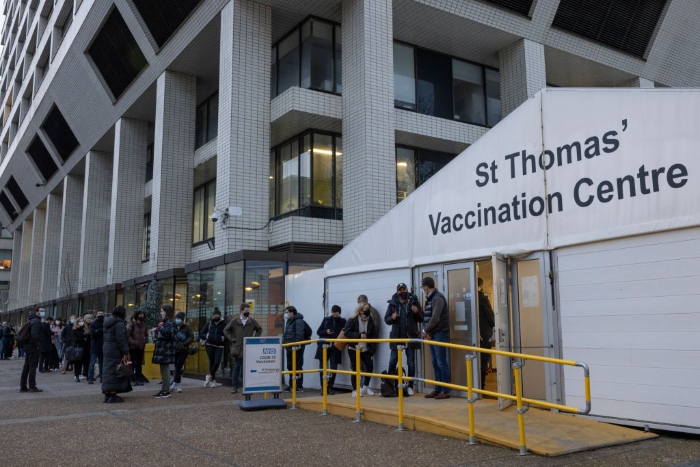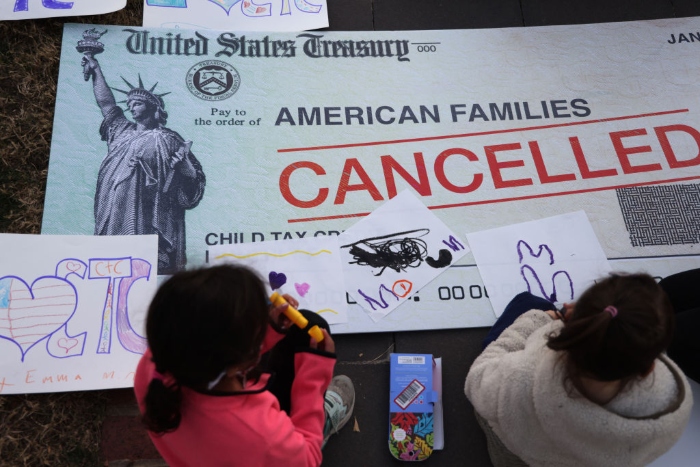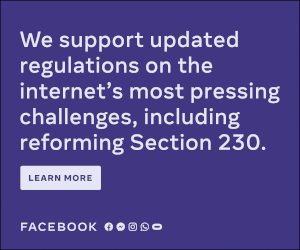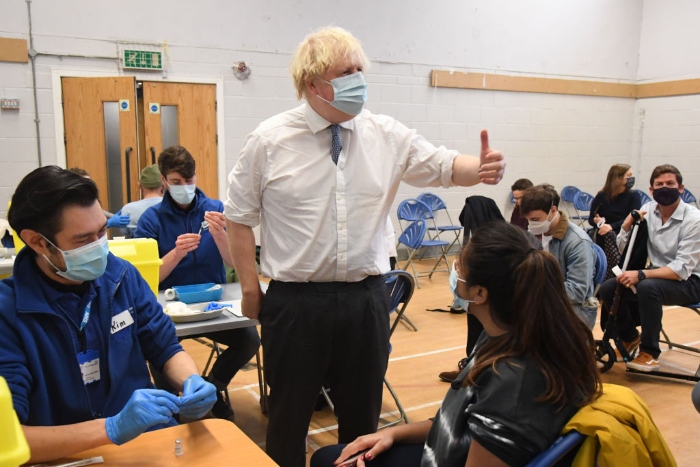| | |  | BY JOANNE KENEN | | With help from Myah Ward
| 
Members of the public line up for Covid-19 vaccinations and booster jabs at St Thomas' Hospital in London. | Dan Kitwood/Getty Images | NOT SO TENDER AND MILD — The early indications suggest that the Omicron variant of the coronavirus typically causes disease that is “mild.” But even if that turns out to be true, “mild” doesn’t mean “no big deal.” Mild Covid-19 can still cause a whole lot of illness, a whole lot of economic disruption, a whole lot of strain on health care systems around the world. In the U.S., the big Omicron wave could hit in January when we could also be wrestling with a travel-propelled post-Christmas Delta surge. Plus maybe the flu. “I’m very worried,” said Marcus Plescia, the chief medical officer at the American Society of State and Territorial Health Officials. Obviously, a case of mild Covid is preferable to coming down with the Vaccine-Evading Killer Bug From Hell that we worried about when we first learned of mutation-riddled Omicrom over Thanksgiving. But because Omicron is so contagious, there could be many, many cases — an exponential outbreak. “This is going to take off. The numbers of people who get sick will be substantial,” Plescia said. And even if only a very small proportion of them end up with severe disease, that still adds up to a lot of very sick people. For instance, if the fatality rate for Omicron turned out to be only one-fourth of that for “original” Covid, but Omicron infected four times as many people, then the same number of lives would be lost. “It’s the math,” said Celine Gounder, an infectious disease specialist at NYU. And “mild” to an epidemiologist doesn’t mean the same thing that “mild” indicates to you and me. Mild to us means not feeling so bad. Mild to the public health professional just means you aren’t in the hospital. “It can knock you off your feet and debilitate you for a few days and we’d still call it mild,” Plescia said. Megan Ranney, an emergency physician at Brown, told Nightly that mild can mean anything from the sniffles to being so feverish and achy that you have to miss school and work — at a time when kids have already missed quite enough school and workplaces are short-staffed. She’s still wearing a mask in public settings. “Even if I don’t get super-sick, thanks to the vaccines,” she emailed me last night, “I can’t afford to take 10 days off of work.” Just as important, the whole “Omicron is mild” theory is tentative. It’s unclear how “mild” the variant’s disease will be in various populations, Gounder said — the vaxxed, the double-vaxxed, the boosted, the unvaccinated, or people with recent prior Covid infections, not-so-recent prior covid infections, no past infections. It’s also way too early to have any idea about the long-Covid risks of Omicron. As Ranney noted, the science isn’t settled on the risk of long Covid in Delta breakthroughs, and that variant has been around for several months now. With Omicron rising, the public health world really wants people who are still unvaccinated to get themselves — and their age-eligible kids — immunized. Concern about Omicron has spurred more vaccinated people to get boosters, but for the unvaccinated, the variant actually creates a tough messaging challenge. The public health messengers are saying, “The extremely contagious Omicron is coming!! Get your shot!” But the unvaccinated people are hearing, “Oh but it’s mild.” Like so much with this pandemic, it’s all in the ear of the beholder. Welcome to POLITICO Nightly. Reach out with news, tips and ideas at nightly@politico.com . Or contact tonight’s author on Twitter at @JoanneKenen.
| |
A message from Facebook: Why Facebook supports updated internet regulations, including Section 230
Aaron is one of 40,000 people working on safety and security issues at Facebook.
Hear from Aaron on why Facebook supports updating regulations on the internet’s most pressing challenges, including reforming Section 230 to set clear guidelines for all large tech companies. | | | | | | 
Children draw on top of a "cancelled check" prop during a rally in front of the U.S. Capitol. | Alex Wong/Getty Images | BIRTH AND TAXES — The final monthly child tax credit payment of 2021 goes out Wednesday to 35 million families. Now it’s up to Democrats to pass President Joe Biden’s Build Back Better bill by Dec. 31 if they don’t want the benefits to lapse in January — or even become the final payment, period, writes Nightly’s Myah Ward. The American Rescue Plan, passed in March, increased the tax credit from $2,000 per child to as much as $3,600, depending on the age of child. The monthly payments began in July, with deposits of $300 for children under 6 and $250 for kids 6 to 17. Families will get the rest of the money when they file their 2021 tax returns, as will other parents who didn’t opt to receive monthly cash. Democrats are hopeful that if anything can unify their party as monthslong, grueling negotiations have forced them right up against the year-end deadline, it’s a historic antipoverty effort for children, POLITICO’s Congress team reported this week. Roughly 450 economists signed a letter to Congress this fall in support of extending the fully refundable child tax credit. In the letter, the economists, including several Nobel Prize winners, cited a growing body of research that indicates the expanded CTC “can dramatically improve the lives of millions of children” while also “promoting our country’s long-term economic prosperity” by addressing child poverty. “It’s hard to get economists to agree on things, but this is one of those cases where the economic research is so strong and telling such a consistent story,” Jacob Goldin, an economist and law professor at Stanford University who signed the letter, told Nightly. “They’re such a good long-term investment, and to do anything that would jeopardize that investment, doesn’t make any sense at all.” In October, CTC payments reached 61.1 million children and kept 3.6 million from poverty, according to Columbia University’s Center on Poverty and Social Policy, which releases monthly numbers showing how many children the CTC has kept from poverty. November’s numbers are expected to be even higher when the center releases the data later this week, Megan Curran, policy director at the center, told Nightly. Families’ most common use of CTC payments was for purchasing food, according to national data from researchers at Washington University in St. Louis, using Census data. Food tops the list in every U.S. state, except for Mississippi, where food and school essentials are neck and neck. U.S. Census data shows significant drops in food insecurity and that families spent CTC checks on school costs and child care when children returned to classrooms this fall. Mastercard data paints the same picture, showing that CTC money drove back-to-school spending in late August. Republicans have called the expanded credit “welfare,” expressing concerns the extra cash keeps otherwise working parents at home. But six months in, Curran said, there is no evidence CTC payments have reduced employment. A national survey from the Center for Law and Social Policy shows that some families say CTC has helped them work more hours outside of the home. “The fact that a single policy can reduce child poverty by 3 to 3.5 million children in a single month is not something that we see in terms of policy impacts for kids in child poverty in this country,” Curran said. Democrats’ biggest barricade to passing their social safety net bill, Sen. Joe Manchin (D-W.Va.), is telling colleagues that the CTC is the biggest inflation driver in the bill, Axios reported Monday. The argument is that inflation is hurting the poor, and by stopping CTC payments, people would spend less and therefore reduce inflationary pressures. But the argument is thin, Goldin said, adding that there are other ways to reduce inflationary pressures without cutting resources to families in need. “The weight of the evidence is that the factors driving inflation are primarily short-term factors,” Goldin said. “And the idea that we would cut short this long-term, important investment out of a misguided effort to deal with those short-term inflationary pressures would be about as big a mistake as we can make.”
| |
| | DON’T MISS CONGRESS MINUTES: Need to follow the action on Capitol Hill blow-by-blow? Check out Minutes, POLITICO’s new platform that delivers the latest exclusives, twists and much more in real time. Get it on your desktop or download the POLITICO mobile app for iOS or Android. CHECK OUT CONGRESS MINUTES HERE. | | | | | | | VOTING OR BBB? Senate Democrats are desperately trying to avoid ending the year stalled on their two top priorities: elections reform and their expansive bill to address climate and the social safety net. At the center of it all sits Manchin. During Majority Leader Chuck Schumer’s leadership meeting on Monday evening, Democratic senators hotly debated how to handle their two biggest unfinished tasks, Marianne LeVine and Burgess Everett write. Some Democrats say they should kick both issues until next year. Others argue the party’s leverage over Manchin won’t improve over time and want action now. And interviews today revealed a party wrestling with how to clinch its top priorities. Sen. Raphael Warnock (D-Ga.) said he spent the weekend talking to Manchin and other Democrats about prioritizing legislation on ballot access, which he called a “moral question” that his party needs to confront. “Voting rights should be the very next thing we do,” Warnock told reporters. “We’ve got to get Medicaid expansion, we’ve got to get child care, we’ve got to get relief to farmers. All of those things matter. But the point I’m making in this moment is: we have to have a democratic framework to continue to push for those things.”
| |
| |  
| | | | | — Judge scraps Trump lawsuit to shield tax returns from Congress: A federal judge has rejected former President Donald Trump’s bid to block congressional Democrats from obtaining his tax returns . Judge Trevor McFadden, a Trump appointee to federal District Court in D.C., said Trump was “wrong on the law” and that Congress is due “great deference” in its inquiries. “Even the special solicitude accorded former Presidents does not alter the outcome,” McFadden wrote in a 45-page ruling. “The Court will therefore dismiss this case.” — Senate passes $2.5T debt limit increase, sending to House: The Senate passed a measure tonight to raise the debt limit to nearly $31 trillion as Democrats race to clear the increase before the United States risks an economically devastating default. The chamber voted 50-49 to adopt the legislation. Across the Capitol, House Democrats are ready to clear the measure for President Joe Biden’s signature as soon as tonight, saving the Treasury Department from fully exhausting its ability to pay interest on the nation's $29 trillion in loans — an economic crisis that could hit as soon as Wednesday. — Ethics board: Cuomo must give back money from $5.1M book deal: The New York state Joint Commission on Public Ethics will require former Gov. Andrew Cuomo to forfeit the money he made from his $5.1 million book deal in 2020. The move comes a month after the commission revoked its authorization allowing Cuomo to profit from his memoir, “American Crisis: Leadership Lessons from the Covid-19 Pandemic.” The book was published in October 2020. — Report: Socialism attacks hurt Dems with Latino voters: A new post-mortem on the 2020 election results reveals that GOP attacks claiming Democrats embrace socialism helped fuel Donald Trump’s gains with Latino voters last year . More than 40 percent of Latino voters across the country expressed concern that Democrats are embracing socialism and leftist policies, according to a survey included in a report released today by Equis, a Democratic research firm. Among those who voted for Trump, more than 70 percent were concerned. And Latino voters said they are more concerned with Democrats moving to the left than with Republicans embracing fascist and anti-democratic politics. — “We owe them action”: Biden honors Sandy Hook victims on 9th anniversary: Biden addressed the families of the victims of the 2012 Sandy Hook Elementary School shooting today , marking the tragedy’s nine-year anniversary by calling it “an unconscionable act of violence.” Biden, who was President Barack Obama’s vice president at the time of the shooting, led the Obama administration’s effort to enact tougher gun control laws in Sandy Hook’s wake. That effort was ultimately unsuccessful when legislation to impose tougher background checks on gun sales — a bill that had been significantly pared back amid fierce opposition — failed on the Senate floor. — D.C. suing the Oath Keepers, Proud Boys for damage caused on Jan. 6: The attorney general of the District of Columbia is suing the Proud Boys, Oath Keepers and 31 members of the far-right groups for participating in the mob that breached the Capitol on Jan. 6. It’s the first government-backed legal action against the groups whose members allegedly stormed the Capitol. Members of Congress and the Capitol Police have already filed similar suits in their personal capacities. — Biden taps Thompson for full term as top housing regulator: Biden will nominate Sandra Thompson, currently the acting director of the Federal Housing Finance Agency, to a full term at the regulator, the White House announced today . If confirmed, Thompson would be the country’s top housing regulator, with oversight of Fannie Mae and Freddie Mac, the government-controlled companies that stand behind about half of the roughly $11 trillion residential mortgage market.
| | | 
British Prime Minister Boris Johnson visits Stow Health Vaccination center in London. | Jeremy Selwyn - WPA Pool/Getty Images | BORIS SCRAPES OUT A WIN — Boris Johnson suffered the biggest parliamentary rebellion of his premiership and had to rely on opposition support to pass plans for tighter coronavirus restrictions, Esther Webber writes. Some 98 Conservative MPs voted against the U.K. leader’s policy that will see a Covid pass — comprising either proof of vaccination or a negative test — required for entry to venues including nightclubs. The rebellion — which came as the government tries to contain the spread of the Omicron Covid variant — effectively wipes out the 80-seat majority he won in 2019. The measure passed thanks to the support of the opposition Labor Party, by 369 votes to 126. But the sheer scale of the rebellion reflects the mounting pressure the prime minister is facing from his own party over his handling of the Covid-19 pandemic. Shadow Health Secretary Wes Streeting told Sky News in the aftermath of the vote that the result reflects “the shattered authority of Boris Johnson.” Conservative MP Geoffrey Clifton-Brown said a leadership challenge to Johnson next year has now “got to be on the cards.” The senior Tory told Sky News: “He’s got to realize that and he’s got to change.”
| |
| | STEP INSIDE THE WEST WING: What's really happening in West Wing offices? Find out who's up, who's down, and who really has the president’s ear in our West Wing Playbook newsletter, the insider's guide to the Biden White House and Cabinet. For buzzy nuggets and details that you won't find anywhere else, subscribe today. | | | | | | | | |
89 percent The reduction of risk of hospitalization or death with Pfizer’s antiviral Covid-19 pill in high-risk patients who’d been experiencing symptoms for three days or fewer, according to final results from a trial of 2,246 adults the company released today. The results tracked with interim findings the company reported last month, which prompted it to petition the Food and Drug Administration for emergency use authorization of the pill, called Paxlovid. |
| | | OSLO GOES DRY — Norway will ban the serving of alcohol in bars and restaurants, Prime Minister Jonas Gahr Støre said , as part of new Covid-19 restrictions intended to stem the spread of the Omicron coronavirus variant, Thibaul Spirlet writes. There’s “no doubt the new variant changes the rules,” Gahr Støre told a news conference Monday, announcing the country’s fourth round of measures in two weeks. “That’s why we need to act fast and we need to act again.” The government also announced stricter rules for schools and the closure of gyms and swimming pools to some users as well as speeding up its vaccination campaign. “For many this will feel like a lockdown, if not of society then of their lives and of their livelihoods,” the PM added. Norway has reported the largest outbreak of Omicron in continental Europe, with 958 cases confirmed, according to the daily bulletin of the EU’s disease control agency on Monday.
| |
A message from Facebook: Why Facebook supports updated internet regulations, including Section 230
Aaron is one of 40,000 people working on safety and security issues at Facebook.
Hear from Aaron on why Facebook supports updating regulations on the internet’s most pressing challenges, including reforming Section 230 to set clear guidelines for all large tech companies. | | |
| |
|
| | Follow us on Twitter | | | FOLLOW US
|
| |

No comments:
Post a Comment